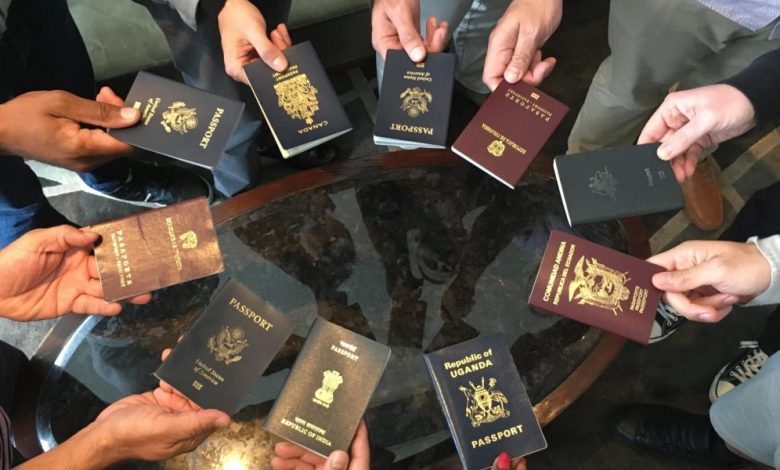The Passport Index World Openness Score hits an all-time high, ranking between the strongest and the weakest

Rushdie had already published dozens of works, including novels, short stories, essays and travelogues, which received widespread acclaim and generated considerable controversy. But he conceded that it was his British passport, which “served its purpose efficiently and unobtrusively,” that allowed him to pursue a literary career on the world stage.
On the other hand, Rushdie considered the Indian passport he had held as a boy in the 1950s “a poor thing”. “Rather than offer the wearer a general ‘open sesame’ anywhere in the world,” he recalled, “it said in grumpy bureaucratic language that it was only valid for travel to a specific — and shockingly short — list of countries.”
Today, global mobility is on the rise. According to The Passport Index, an interactive ranking tool from investment firm Arton Capital, the World Openness Score hit an all-time high in late 2022. And the score has continued to rise.
This means that passport holders around the world will be allowed to travel to more countries than ever before without a prior visa. As pandemic-related travel restrictions eased in 2022, the total number of visa waivers globally increased by 18.5%. Almost every passport on the index, which includes 193 United Nations member countries and six territories, became more powerful, with holders gaining instant access to an average of 16 more countries.
But there’s still a huge mobility gap between the most powerful and the least powerful passports – and this is having a major impact on where people can travel, live and work. The United Nations may proclaim that “everyone has the right to leave any country, including his own, and to return to his country,” but the fact is that not all passports are created equal or treated with equal respect.
mobility for some
In my book, License to Travel: A Cultural History of the Passport, I examine the evolution of travel documents and how passports have influenced the emotions and imaginations of their holders. Writers and artists like Rushdie have played an important role in identifying and tackling inequalities in movement. They were also pioneers in introducing new forms of international openness.
Despite ongoing migrant crises, disease outbreaks, military conflicts, economic challenges and growing nationalist movements, the world is trending towards greater openness. Still, the international community has made little effort to address persistent inequalities in the global passport regime.
Like it or not, our passports define who we are in the geopolitical order. And unsurprisingly, the world’s rich have better prospects.
Firms like Arton Capital and Henley & Partners, the curators of a competing passport ranking index, have sprung up in recent years to assess these prospects. They also advise investors, business people and other high net worth individuals on ways to obtain a second passport when it is beneficial.
At the top of Arton’s power rankings, UAE passport holders can travel visa-free or visa-on-arrival to 181 countries and territories. US passport holders rank slightly lower, with access to 173 countries.
At the bottom of the list is Afghanistan, whose passport holders have direct access to just 39 countries. Holders of Syrian, Iraqi, Somali and Bangladeshi travel documents perform only slightly better.
Nations drop to the low ranks for many reasons, including struggling economies, large displaced populations, and tumultuous histories of foreign invasions and civil wars.
In fact, Arton’s Passport Index codified the disparity that Rushdie noted. Even today, after the Brexit referendum, a British passport allows travel to 173 countries without a prior visa. An Indian passport allows access to only 71.
Mobility for everyone
How do we account for the human costs associated with those passing scores and rankings?
Renowned German choreographer Helena Waldmann explored this divide in her 2017 dance work Good Passports Bad Passports. This production stages a series of dramatic encounters between two groups of dancers, sometimes separated by a wall of other performers. It commemorates border crossings, border patrols, passport controls and other aspects of the global migrant crisis.
Waldmann’s inspiration was the mobility gap. Traveling with dancers and crews from different parts of the world, she has often witnessed those with “bad” passports being stopped and subjected to intense questioning. In the meantime, Waldmann has managed the customs and immigration process quickly and easily with her “good” German passport.
https://youtube.com/watch?v=mha7FvpCDeA%3Fwmode%3Dtransparent%26start%3D3
Good Passports Bad Passports ends with a remarkable gesture of human solidarity. As a ghostly voice proclaims, “I believe that one day there will be no national borders,” the entire cast steps out in front of the stage, crossing their arms and gazing out at the audience.
Famed Chinese artist Ai Weiwei highlighted these issues in his award-winning 2017 documentary Human Flow, which captures the overwhelming magnitude of the migrant crisis. In a stunning scene filmed in a rain-swept migrant camp on the Greek-Macedonian border, Ai converses with a Syrian refugee. To demonstrate their relationship, the men pull out their passports and playfully offer to exchange them on site.
It’s a devastating parody of the well-known passport control ritual. Instead of inspecting the document and questioning the holder, Ai makes a gesture of radical hospitality. He offers, if only symbolically, his own passport, his own citizenship – his own place in the world.
In this clip from Human Flow, Ai Weiwei and Mahmoud, a Syrian refugee, pretend to exchange passports and identities.
https://youtube.com/watch?v=mha7FvpCDeA%3Fwmode%3Dtransparent%26start%3D3
An alternative “passport”
A world without borders or passport controls may be a utopian dream, but that hasn’t stopped other artists from imagining correctives for our current situation.
In 2009, Maltese writer Antoine Cassar published a protest poem entitled ‘Passaport’ which was printed in a small format and bound in a red cardboard cover mimicking the Maltese passport. Rather than attaching a photograph, personal information, and the legal terminology of the nation-state, it contains some 250 lines of verse protesting the hurtful power of the international passport system and its often brutal forms of exclusion and displacement.
“Passaport,” as Cassar puts it, “envisions a world with no customs and checkpoints, no border police snatching the dawn, no need for forms, documents, or biometrics. … A world without the need to cross the desert barefoot or float away on a raft, down a route of hope all too quickly dashed by the reality of blackmail and exploitation.”
Open the future
In 2022, Hrant Boghossian, co-founder of Arton Capital, commented that “the increase in passport power that we have seen this year offers great cause for optimism”. This is certainly true.
“The world has surpassed the pre-pandemic benchmark for ‘openness’,” Boghossian continued, “and there are strong signs that this upward trend will continue.” He finds particularly encouraging the fact that this is happening at a time of increasing economic turbulence and political tensions, as well as ongoing concerns about internal security and mass migration.
Indeed, as we emerge from the COVID-19 pandemic and face the devastating effects of climate change, the motivation to leave home in search of work and safety will continue to increase. But the world still has a long way to go in opening up to the entire global community.
Patrick Bixby is an Associate Professor of English at Arizona State University.
This article was republished by The Conversation under a Creative Commons license. Read the original article.



